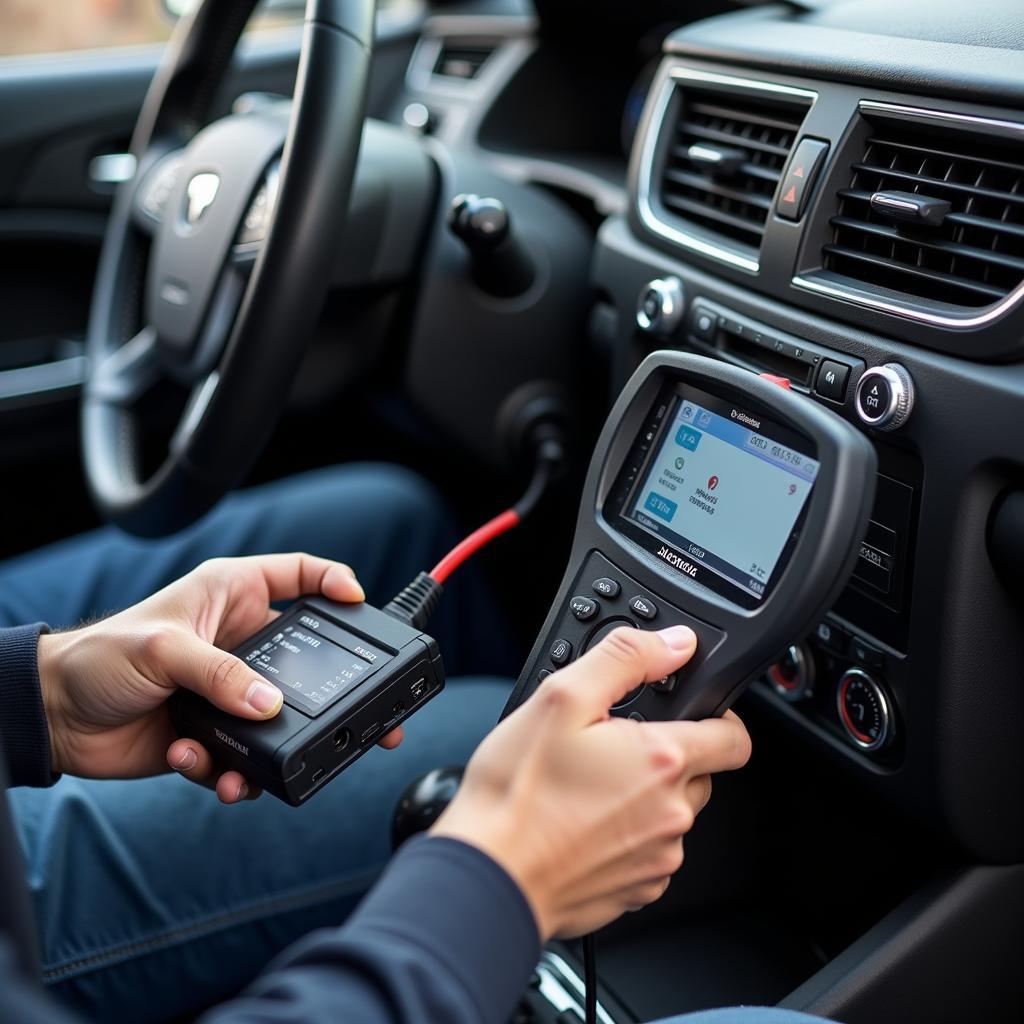A diagnostic car test, also known as a car scan or vehicle diagnostic, is like a health check for your car. Using a specialized tool that connects to your vehicle’s onboard computer, it retrieves and analyzes data about the various systems within your car. But What Does A Diagnostic Car Test Carry Out exactly? What kind of information does it reveal about your car’s health?
This comprehensive guide will delve deep into the world of car diagnostics, explaining everything you need to know about what they are, how they work, and the valuable information they provide.
Unraveling the Mysteries: What Does a Car Diagnostic Test Look For?
Think of your car as a network of interconnected systems, each with its own language. A car diagnostic test acts as a translator, deciphering the information stored within these systems and presenting it in a way that’s understandable to mechanics and car owners. Here are some of the key areas a diagnostic test examines:
- Engine Control Module (ECM): This is the brain of your vehicle, controlling everything related to engine performance. The test checks for issues like misfires, fuel injection problems, and oxygen sensor readings.
- Transmission Control Module (TCM): Responsible for gear shifting and overall transmission health, this module’s data can reveal problems with shifting, slippage, or clutch engagement.
- Anti-lock Braking System (ABS): This test focuses on the safety and functionality of your braking system, identifying issues with wheel speed sensors, brake fluid pressure, or hydraulic components.
- Airbag System: This vital safety feature is also scrutinized, ensuring all sensors, modules, and deployment mechanisms are in optimal working order.
- Emissions System: A crucial aspect of modern vehicles, the emissions test checks for issues with the catalytic converter, oxygen sensors, and evaporative emissions system, ensuring your car meets environmental standards.
 Car Diagnostic Test Equipment
Car Diagnostic Test Equipment
Beyond the Basics: Unveiling Hidden Problems
While many associate car diagnostic tests with the “check engine” light, their capabilities extend far beyond that. These tests can often identify issues before they even trigger warning lights or become noticeable to the driver.
Here are some examples of how a car diagnostic test can uncover hidden problems:
- Intermittent Issues: Have you ever experienced a strange noise or performance hiccup that seems to disappear as quickly as it came? Diagnostic tests can capture and store data even when the problem isn’t actively occurring, allowing mechanics to pinpoint the root cause.
- Early Detection: Car problems rarely appear out of thin air. Often, subtle changes in sensor readings or system performance can be early indicators of a developing issue. Diagnostic tests can detect these subtle changes, allowing for preventative maintenance and potentially avoiding costly repairs down the line.
- Confirmation of Suspicions: Sometimes, you might have a hunch about what’s wrong with your car based on certain symptoms. A diagnostic test can either confirm your suspicions or provide more specific data to guide further investigation and repair.
Different Types of Diagnostic Car Tests:
Not all car diagnostic tests are created equal. There are various levels of depth and complexity, depending on the tools used and the expertise of the technician.
- OBD-II Code Readers: These are the most basic diagnostic tools, often available for purchase by car owners. They can read and clear basic diagnostic trouble codes (DTCs), giving you a general idea of what might be wrong.
- Professional-Grade Scanners: Mechanics and dealerships use advanced scanners that provide much more detailed information than basic code readers. They can access live data streams, perform actuator tests, and even program certain vehicle modules.
 Mechanic Analyzing Car Diagnostic Results
Mechanic Analyzing Car Diagnostic Results
The Value of a Diagnostic Car Test: Why It Matters
In an age of increasingly complex vehicles, car diagnostic tests have become an indispensable tool for maintaining and repairing cars. Here’s why:
- Accurate Diagnosis: Gone are the days of relying solely on intuition and experience to diagnose car problems. Diagnostic tests provide concrete data, leading to faster and more accurate repairs.
- Cost Savings: By identifying problems early on, you can often address them before they escalate into major (and expensive) issues.
- Peace of Mind: Knowing that your car has been thoroughly checked and any potential problems have been identified can give you valuable peace of mind on the road.
Conclusion: Empowering Car Owners Through Knowledge
Understanding what a diagnostic car test carries out is empowering. It allows you to take a more proactive approach to car maintenance, make informed decisions about repairs, and ultimately, enjoy a safer and more reliable driving experience.
Whether you choose to invest in a basic OBD-II code reader for DIY diagnostics or rely on the expertise of a trusted mechanic with professional-grade equipment, regular car diagnostic tests are an invaluable investment in the health and longevity of your vehicle.

Leave a Reply